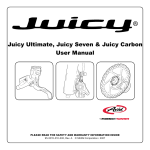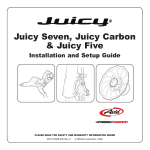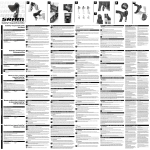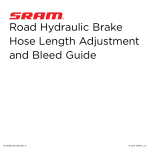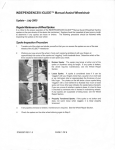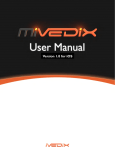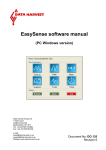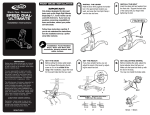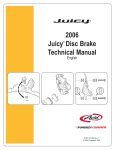Download User Manual - Bike
Transcript
User Manual Please read the safety and warranty information inside 95-5015-009-000, Rev B © SRAM Corporation, 2007 CODE & CODE 5 User Manual English Congratulations! You have selected the best hydraulic disc brakes your money can buy! This manual contains important information for installing and setting up and adjusting your new brakes. To ensure that your Avid brakes perform properly, we recommend that you have them installed by a qualified bicycle mechanic. We also urge you to follow all of our recommendations to help make your riding experience safe, enjoyable and trouble free. CPS First, here is some information to get you started: Hardware TRI-ALIGN™ CALIPER POSITIONING SYSTEM™ Avid disc brakes use a unique alignment system called Tri-align Caliper Positioning System (CPS). These stacks of concave and convex washers allow the caliper to be perfectly aligned with the rotor, regardless of imperfections in the mounting tabs on the fork or frame, giving you full, square pad contact. Pad Break-In It may take anywhere from 20 to 40 complete stops to break in Avid pads. You may begin to notice an increase in braking power after the first ride. Brake noise can occur not only during the break-in period but off and on throughout the life of the brake pads. Noise is dependent upon factors such as brake setup, rider weight, riding style, braking style, and riding conditions (i.e. dust, soil, moisture, and contamination of friction surfaces). CPS Bolt CHANGING HOSE LENGTHS & BLEEDING Changing hose lengths and bleeding Avid disc brakes requires the Avid Bleed Kit Please contact your local bike shop or www.avidbike.com for details. TOOLS NEEDED • 2, 2.5mm, 4 and 5mm hex wrenches • T-25 TORX® wrench • 10mm open-end wrench • Adjustable torque wrench: 2.8-10Nm (25-90 in-lb) range • Safety glasses Make sure you have the right brackets 30 2 .0 t . 01 u n 15 M o . 5 3 st 0 0 3 Po 20 0 0 20 2 .0 t . 01 o u n 15 . 5 3 st M 0 0 Po 5 18 0 2.3 .6 0 73 o nt r .53 11 20 F QR 4 2 .0 . 01 t n 15 .5 3 Fro 0 0 3 IS 20 00 2 .6 er .50 X X 73 t B o n .53 11 Fro 3 20 30 2 .0 er . 01 X X 15 Bo . 5 3 nt 0 0 Fro 5 18 00 2 .0 . 01 15 nt .5 3 Fro 0 0 IS 5 18 00 2.9 .3 0 76 o n t .5 3 Fr 11 IS ear E) 0 R 16 IS CO D 0 14 c ept (ex 0 5 2 .0 . 01 15 ar . 5 3 Re 0 0 3 IS 20 0 10 2 .0 . 01 15 ar . 5 3 Re 0 0 IS 5 18 0 2 .6 .40 76 a r . 5 3 Re 11 IS 0 16 © SRAM Corporation • 2007 English CODE & CODE 5 User Manual SAFETY INFORMATION Brakes are a safety-critical item on a bicycle. Improper setup or use of brakes can result in loss of control or an accident, leading to a severe injury. Avid disc brakes are designed as a system. Do not use components from a manufacturer other than Avid within the system. Avid brakes are a performance product that offer increased stopping power over brakes that you may be use to. This greater power requires less effort to lock-up a wheel when braking. A wheel lockup might cause you to lose control and possibly cause injury. Avid disc brake rotors are compatible with 44mm, 6-bolt international standard disc hubs. It’s your responsibility to learn and understand proper braking techniques. Consult the owner’s manual for your bicycle and a professional bike dealer. Practice your riding and braking techniques on a flat and level surface prior to aggressive riding. The effectiveness of braking is dependent on many conditions over which SRAM has no control. These include the speed of the bicycle, type and condition of riding surface, braking lever force, proper installation and maintenance of brakes, brake lines, hydraulic fluid, levers, brake pads, condition of the bike, weight of the rider, proper braking techniques, weather, terrain, and a variety of other factors. Avid brakes and levers are not intended for use on any motorized bicycle or vehicle. Such use could result in a serious personal injury. ALWAYS RIDE UNDER CONTROL Remember, it takes longer to stop in wet conditions. To reduce the possibility of an accident and minimize trail erosion, you should avoid locking-up your wheels. 1 English Install rotor Mount the rotor to the hub using the supplied T-25 TORX® bolts and tighten to the specified torque. Avid logo MUST face out. Install the wheel into the fork or frame. TORQUE TO: 9-10 Nm (80-90 in-lb) We recommend 32 or 36-spoke wheels with a 3 or 4 cross spoke lacing pattern. Contact your specific wheel manufacturer for more specifications. DO NOT USE RADIALLY SPOKED WHEELS. Use only DOT 4 or DOT 5.1 fluids with AVID disc brakes. Do not use a fluid other than the DOT fluids suggested. Doing so will damage the system and make the brakes unsafe to use. 2 MOUNT FRONT CALIPER Mount the front caliper (shorter hose) to the fork. Post Mount i.s. MOUNT DOT fluids will damage painted surfaces. If any fluid comes in contact with a painted surface (i.e. your frame), wipe it off immediately and clean with isopropyl alcohol. or Do not allow any brake fluid to come in contact with the brake rotors. If this occurs, clean the rotors with isopropyl alcohol. Remove... Do not allow any brake fluid to come in contact with the brake pads. If this occurs, the pads are contaminated and must be replaced. ...then mount direct TORQUE TO: 9-10 Nm (80-90 in-lb) Warning Do not touch the braking surface of any rotor with your bare hands, because the oils from your fingers will degrade its performance. Always wear gloves, or handle the rotor by its spokes. CODE & CODE 5 User Manual Disc brakes become very hot during use. Do not touch the caliper or rotor immediately after use. Make sure the brake has cooled down before making any adjustments. 95-5015-009-000, Rev.B Loosen before mounting I.S. mount Loosen the CPS bolts, then bolt the caliper to the mounting tabs. Tighten the mounting bolts to the specified torque. Check that the caliper moves freely on the CPS hardware. © SRAM Corporation • 2007 Snug, then back off 1/8th to 1/4th turn Post Mount Remove the mounting bracket but leave the CPS bolts and washer stacks intact. Bolt the caliper directly to the fork. Snug the bolts, then back them out 1/8th to 1/4th turn. Check that the caliper moves freely on the CPS hardware. English 3 CODE & CODE 5 User Manual Loosen before mounting MOUNT REAR CALIPER Loosen the CPS bolts, then mount the rear caliper (longer hose) to the I.S. tabs on the rear of the bike. Tighten the mounting bolts to the specified torque. Check that the caliper moves freely on the CPS hardware. CODE & CODE 5 User Manual 5 MOUNT LEVERS Mount the levers onto the handlebar in the proper position. Arrows must point up. Make sure there is enough hose for the handlebar to turn freely side to side. Tighten the top bolt completely to the specified torque so there is no gap. Tighten the bottom bolt to the same torque. Gap ADJUST HOSE ANGLE, THEN ROUTE If necessary, you can change the banjo position to improve hose routing. Start by removing the brake pads so you don’t risk getting DOT fluid on the pad surface (see pad replacement steps for directions). Next slightly loosen all four caliper bolts along the outside of the caliper. Rotate the banjo fitting to the desired position and re-tighten all four caliper bolts to the specified torque. Make sure there is enough hose at critical points to allow for suspension movement, but also make sure there aren’t any big loops of extra hose. Now, secure the hoses to the frame and fork. Note: You may have introduced air into the system by changing the banjo position, don’t be lazy, take 5 minutes and bleed the system when you are done with the installation. No Gap Mount levers with arrows facing up TORQUE TO: 9-10 Nm (80-90 in-lb) 4 English TORQUE TO: 2.8-3.4 Nm (25-30 in-lb) Check that the bars turn freely. If there is excess hose in this area, see the instructions on changing hose lengths and bleeding the system TORQUE TO: 5.9-6.4 Nm (52-56 in-lb) 5a RIGHT-HAND FRONT (optional) To run moto-style (right-hand front), just remove the back of the clamps, swap the levers and reinstall the clamps so the arrows face up, as in step 5. 95-5015-009-000, Rev.B © SRAM Corporation • 2007 English 6 CODE & CODE 5 User Manual CODE & CODE 5 User Manual 8 ALIGN AND TRUE CALIPERS Squeeze the front lever 5 or 6 times, then hold. Compress the lever (with your hand or a rubber band), then snug the CPS bolts enough to hold the caliper in place. TORQUE TO: 8-10 Nm (70-90 in-lb) (in an alternating fashion) ADJUST pad engagement point: code Now it’s time to set the pad contact point exactly where it feels best for your hand. Experiment, turn the red adjuster knob both ways and see what different settings feel like. Then, chose the spot that you prefer. You can change the setting whenever you want. PAD CO ACT NT Spin the wheel and check for rotor drag. If there is drag, loosen the CPS bolts and repeat. Once there is no drag, torque the CPS bolts in an alternating fashion to the specified torque. Repeat the procedure for the rear brake. English IN IN (clockwise): The lever will engage later. 7 OUT (counter-clockwise): The lever will engage earlier. ADJUST REACH: code Use a 2.5mm hex wrench to adjust the reach if necessary. Tip: You can also use the rebound adjuster knob from a RockShox fork to make this adjustment. ADJUST REACH: code 5 Use a 2mm hex wrench to adjust the reach if necessary. One click equals 1mm of adjustment. If using twist shifters, it will be necessary to slide the levers away from the shifters or remove them completely to access the reach adjustment screw. Re-torque the lever clamp bolts as noted in Step 5 after adjusting the lever reach. One “click” of the 2mm hex reach adjust screw here... 2.5mm hex reach adjust screw ...equals 1mm of adjustment here 95-5015-009-000, Rev.B © SRAM Corporation • 2007 English CODE & CODE 5 User Manual CODE & CODE 5 User Manual PAD REPLACEMENT SRAM Corporation Warranty 1. Remove pad retainer bolt Start by removing the “E” clip on the wheel side of the caliper, then unscrew the retainer bolt using a 2.5mm hex wrench. Remove the retainer bolt all the way. The “E” clip goes on the wheel side of the caliper 2. PUSH THE PISTONS BACK IN CODE calipers are self-adjusting, the pistons need to be pushed back into the body to their original position before the new pads can be installed. The safest way to do this is with the old pads still in the caliper to protect the pistons. Place a flat-blade screwdriver between the old pads, then carefully rock it back and forth, pushing the pistons back into their bores. Extent of Limited Warranty SRAM warrants its products to be free from defects in materials or workmanship for a period of two years after original purchase. This warranty only applies to the original owner and is not transferable. Claims under this warranty must be made through the retailer where the bicycle or the SRAM component was purchased. Original proof of purchase is required. Local law This warranty statement gives the customer specific legal rights. The customer may also have other rights which vary from state to state (USA), from province to province (Canada), and from country to country elsewhere in the world. To the extent that this warranty statement is inconsistent with the local law, this warranty shall be deemed modified to be consistent with such law, under such local law, certain disclaimers and limitations of this warranty statement may apply to the customer. For example, some states in the United States of America, as well as some governments outside of the United States (including provinces in Canada) may: a.Preclude the disclaimers and limitations of this warranty statement from limiting the statutory rights of the consumer (e.g. United Kingdom). b.Otherwise restrict the ability of a manufacturer to enforce such disclaimers or limitations. 3. REMOVE THE OLD PADS Grab one of the pad tabs and slide the pad toward the center of the caliper (this disengages the pad backing plate from the post in the center of the piston), then pull the pad straight out. Repeat for the other pad. Note: The spreader clip that sits in between the pads may not come out with the second pad. If not, push it out from the open top of the caliper with your little finger. 4. INSTALL THE NEW PADS AND SPREADER Be sure the spreader clip is oriented to the pads as shown below. Squeeze the pad and clip assembly together, then insert into the caliper as a unit. Firmly push until the assembly “clicks” into place. Limitations of Liability To the extent allowed by local law, except for the obligations specifically set forth in this warranty statement, In no event shall SRAM or its thirdparty suppliers be liable for direct, indirect, special, incidental, or consequential damages. 5. RE-INSTALL pad retainer bolt Replace the pad retainer bolt, tighten to torque specifications, and replace the “E” clip on the wheel side of the caliper. hydraulic disc brake hose length adjustment and bleeding Avid Hydraulic Disc Brakes come with hoses already attached in an “average” length. The system has already been bled, so if you don’t need to change the hose length, then you are ready to ride. If however, you do need to change hose lengths, you will need an Avid Bleed Kit or we recommend you have a professional bicycle mechanic perform the service for you. Avid Bleed Kits provide complete instructions and Avid tools for adjusting the hose length as well as bleeding the brake system. The instructions are also available online at www.sram.com or www.avidbike.com. 10 English 95-5015-009-000, Rev.B Limitations of Warranty • This warranty does not apply to products that have been incorrectly installed and/or adjusted according to the respective SRAM technical installation manual. The SRAM installation manuals can be found online at www.SRAM.com, www.rockshox.com or www.avidbike.com. • This warranty does not apply to damage to the product caused by a crash, impact, abuse of the product, non-compliance with manufacturer’s specifications of usage or any other circumstances in which the product has been subjected to forces or loads beyond its design. • This warranty does not apply when the product has been modified. • This warranty does not apply when the serial number or production code has been deliberately altered, defaced or removed. • This warranty does not apply to normal wear and tear. Wear and tear parts are subject to damage as a result of normal use, failure to service according to SRAM recommendations and/or riding or installation in conditions or applications other than recommended. © SRAM Corporation • 2007 Wear and tear parts are identified as: - Dust seals - Bushings - Air sealing o-rings - Glide rings - Rubber moving parts - Foam rings - Rear shock mounting hardware and main seals - Stripped threads/bolts (aluminum, titanium, magnesium or steel) - Upper tubes (stanchions) - Brake sleeves - Brake pads - Chains - Sprockets - Cassettes - Shifter and brake cables (inner and outer) - Handlebar grips - Shifter grips - Jockey wheels - Disc brake rotors - Tools • This warranty shall not cover damages caused by the use of parts of different manufacturers. • This warranty shall not cover damages caused by the use of parts that are not compatible, suitable and/or authorized by SRAM for use with SRAM components. • This warranty shall not cover damages resulting from commercial (rental) use. SRAM Corporation 1333 North Kingsbury, 4th Floor, Chicago, Illinois 60622 1-312-664-8800 • fax 1-312-664-8826 www.avidbike.com 11






